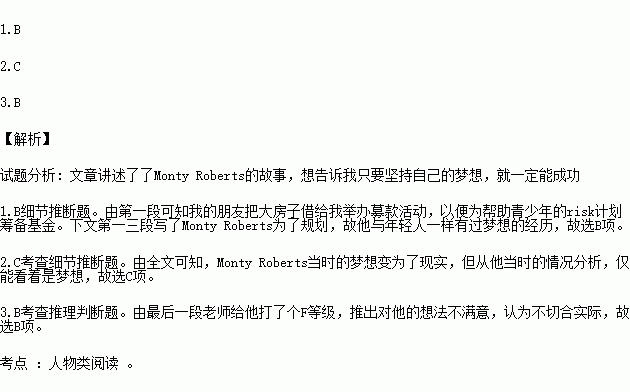题目内容
I have a friend named Monty Roberts who owns a horse ranch in San Ysidro. He has let me use his house to put on fund-raising events to raise money for youth at risk programs.
The last time I was there he introduced me by saying, "I want to tell you why I let Jack use my house.” It all goes back to a story about a young man who was the son of a horse trainer who would go from stable to stable, race track to race track, farm to farm and ranch to ranch, training horses. As a result, the boy's high school career was continually interrupted. When he was a senior, he was asked to write a paper about what he wanted to be and do when he grew up.”
That night he wrote a seven-page paper describing his goal of someday owning a horse ranch.He wrote about his dream in great detail and he even drew a diagram of a 200-acre ranch, showing the location of all the buildings, the stables and the track. Then he drew a detailed floor plan for a 4,000-square-foot house that would sit on a 200-acre dream ranch.”
He put a great deal of his heart into the project and the next day he handed it in to his teacher. Two days later he received his paper back. On the front page was a large red F with a note that read, "See me after class.”
1.Why can the writer use Roberts's house to raise money for youth at risk programs?
A. Because they are good friends.
B. Because the youth has the same dream as Monty Roberts.
C.Because Monty Roberts has a poor childhood.
D. Because Monty Roberts like to help youth.
2.What do you think of Monty Koberts' goal of a horse ranch at that time?
A. romantic B. real
C. dream D. false
3.What would happen after the teacher gave a note "See me after class.”?
A. Monty Roberts got very angry at this.
B. The teacher would criticize him.
C. The teacher wanted to tell him that his dream would come true.
D. The teacher would encourage him.

